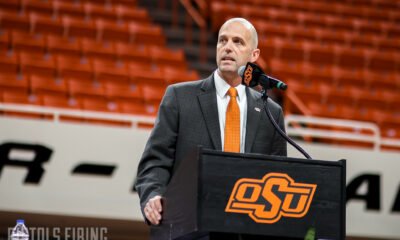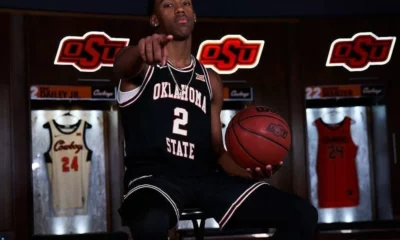Football
Five Thoughts on the Future Legalization of Sports Gambling
After the Supreme Court recently batted down a 1992 law that made gambling on sports illegal in every state except for Nevada, confusion reigned among sports fans. What does this mean for my state? How will this affect college sports? Should I put two big ones on Oklahoma State over 8.5 for the upcoming season? I should, right?
I was at lunch last week talking to a friend about how Mark Cuban said every sports franchise doubled in value overnight with this (potential) new stream of revenue (as self-serving a statement as you can possibly utter!), and he asked me something I had yet to consider: What does this mean for your business?
My answer then, as now, is that I have no idea. Wagering on sports in the state of Oklahoma, and the state of Texas for that matter, is still illegal as of this writing. It would appear that it will eventually be legal in both states, although who knows when that will take place. It’s certainly a topic that fascinates me because it conflates a lot of things I love — business models, journalism and sports — into one (sometimes very costly) amalgamation that I may fundamentally and ethically disagree with.
So that’s complex on a personal and professional level, and I’m not sure what to do with or about it. The good news is that I have a little time to sort that out, maybe even several years.
New Jersey, Pennsylvania, Mississippi and West Virginia have already passed bills that could allow them to begin taking bets almost immediately. According to Eilers & Krejcik Gaming LLC, which tracks state gambling legislation, legalized sports betting outside of Nevada would be worth more than $6 billion.
They estimated that if all 50 states got on board, legal sports betting could be worth $7.1 billion to $15.8 billion. That company envisions 14 states legalizing sports wagering within two years and 18 more states – Oklahoma among them – legalizing it within five years. [Stillwater NewsPress]
For now, based on the information I currently have, here are five thoughts on what sports gambling means for college sports and for the future.
1. It’s going to be costly
One of the common themes I’ve been reading about as it relates to NCAA institutions is that, in the same way athletic departments have padded themselves to handle social media issues they will have to do so 10x to ensure compliance regarding wagering.
“The schools are concerned that they’re going to be taking a lot of risk and are going to have increased compliance costs,” said Tom McMillen, head of the Division I Athletic Directors Association. “A lot of these schools have not been in the loop on a lot of this. A lot of these discussions have been going on without the universities’ input. These are the crown jewels of your states, and you can’t set public policy on sports betting without involving your universities.” [ESPN]
There’s a way to do it, and I don’t think it’s as complex as some people are insinuating, but the checks and balances of whatever system is put into place will be pricey.
However …
2. It also (could be) profitable
Colleges are currently feeling out how to get in on a revenue stream that could approach (at the very least) tens of billions of dollars annually because … why wouldn’t you?
On Thursday, representatives from Missouri, Rutgers and UConn participated in a conference call with Major League Baseball to consider options, including potentially creating a mechanism where a percentage of the amount wagered on events involving college teams would be funneled back to the schools. Major League Baseball, along with the NBA and PGA Tour, has been lobbying for similar fees to be paid to the professional leagues based on the amount wagered. [ESPN]
Many professional institutions have long been in favor of the legalization of gambling for reasons I noted above. Namely: ?.
The two primary issues I see the NCAA and colleges having to get past are 1. The whole faux amateurism thing that needs to be absolved anyway and 2. It gets dicey when there is third-party money being tossed around a public government institution.
The first problem is largely a perception one but it also may get at the more fundamental reality that college athletes in a massively successful industry are not paid real money. The second problem is just as difficult to regulate, if not more so.
Issue No. 1 summarized
NCAA: Student-athletes, you may have heard, are not paid (as professional athletes are), which makes them more vulnerable to being compromised. A Toledo running back once admitted to fumbling on purpose in a bowl game for just $500 as part of a gambling plot. Sure, any game can be compromised, but pro sports athletes — and even the officials these days — make enough for a shady character hoping to influence the outcome to have a tougher challenge.
The NCAA opposes sports betting and believes it is a threat to the well-being of the student-athletes, but now may need to ask for compensation from the legal market to handle any increased compliance costs. Asking for money from something you adamantly oppose is a difficult position. [ESPN]
And that is an unmitigated mess on a number of levels.
Issue No. 2 summarized
New Jersey’s laws prohibit betting on games involving state schools, such as Rutgers and Seton Hall, as well as any sporting event hosted inside the state. Delaware has similar stipulations in place. Nevada sportsbooks are allowed to accept wagers on games involving UNLV and the University of Nevada. Those schools do not receive any fees directly from the betting activity on their games. [ESPN]
There is even some talk that the NCAA might seek out a NCAA-only ban, which is kind of amazing considering how much money it stands to lose if it goes this route in lieu of pursuing a cut of the gambling revenue.
On Thursday, the NCAA announced that it was suspending its policy of prohibiting championship events to be hosted in states with legal sports betting. The NCAA also said it supported a federal framework be put in place for sports betting. In December, NCAA President Mark Emmert floated the idea of a carve-out that would ban betting on college sports. [ESPN]
The NCAA is twisted into knots a million different ways and many of them are specifically because they refuse to allow student-athletes to be paid.
3. Opportunity for State of OK
As of today, the illegal betting market in Oklahoma is estimated at over $1.5 billion annually. And yet … Oklahoma politicians are acting like they aren’t all in on legalizing this.
“If we do it, there’s going to be a lot of debate over whether or not this is the direction we need to go,” said House Majority Floor Leader Jon Echols, R-Oklahoma City. “I don’t think it’s a foregone conclusion that this is something Oklahoma will do. But the foregone conclusion is that it is something Oklahoma will analyze.”
Me considering the state of Oklahoma not doing this with the current shortfall in public education funding and possibility of getting even a sliver of a $1.5 billion pie.

While I agree with this editorial from the Tulsa World, I’m LOLOLing at the thought of lawmakers not figuring this out for the following reasons.
Reason No. 1
The “we badly need money and a public makeover, and this provides both” reason.
Oklahoma needs to play this hand strategically. If done right, it could stave off the need for future tax increases, help fund critical state services and increase business at Oklahoma’s casinos without producing more of the social problems associated with problem gambling. [Tulsa World]
Reason No. 2
Also known as the “there’s no reason to turn down free money” reason.
Consider the already legal parimutuel wagering at Oklahoma’s racetracks and off-track betting parlors and it’s hard to argue that the state here has a moral objection to gambling on sports.
If Gov. Mary Fallin has to call the Legislature back into special session to consider rules for implementation if State Question 788, the medical marijuana issue, passes in June, lawmakers should seize the opportunity to allow sports wagering in Oklahoma.
There is no moral high ground to take, and Oklahomans gambling on sports is inevitable. Pretending it’s not going to happen is like believing March Madness brackets are just for bragging rights or that no bar in the state has a guy sitting on the next-to-last barstool who can get you odds on the Super Bowl. [Stillwater NewsPress]
4. There will be buzzword salad
Here’s what OU athletic director Joe Castiglione said recently about the legislation.
“Going forward, I think it’s important for universities and colleges to seek the assistance of our respective states in developing a regulatory approach in order to properly manage our overall responsibility in this new age, as well as uphold the integrity of our competitions,” he said. [NewsOK]
It’s just a mad lib of CEO buzzwords tossed into a long sentence! It will be important to cut through the fat as it relates to all of this in the coming years. Unfortunately folks like Castiglione probably won’t help in this endeavor. But maybe he should! Here’s the ending of a fascinating piece from Syracuse sports law professor John Wolohan.
The NCAA has opposed the expansion of sports gambling, but in fact it should be celebrating. The biggest sources of revenue for college athletic programs are television money and gate receipts. And although Kentucky, Syracuse, and Louisville may each have averaged over 20,000 fans for their basketball games in 2017, according to the NCAA the average attendance for Division I colleges has declined for the last 10 years.
At the Football Bowl Subdivision level, the average attendance has declined for four straight years. However, what is more troubling than fewer people attending games is that people are also watching fewer games on television.
With expenses at top-level athletic programs running into the tens of millions of dollars, NCAA institutions have been questioning how to keep their fans engaged and attending games. The Supreme Court just gave them their answer: Given that people who bet on sports watch more games than the average fan, when sports gambling becomes legal it should lead to an increase in game attendance and TV viewers — and that would be a victory for the NCAA. [Chronicles of Higher Edu.]
5. Stigma is gone
I thought this piece by Bryan Curtis (like most pieces by Bryan Curtis) was fabulous. There is such a stigma around wagering money on sports, and while that veil has torn over the past few decades, it still exists because, you know, it’s illegal.
It’s ultimately probably a good thing that most states will legalize — regardless of whether you agree with the decision — and I’m fascinated to see how the NCAA as well as various universities handle it going forward.

-

 Football3 days ago
Football3 days agoFour-Star Quarterback Adam Schobel Commits to Oklahoma State, Flips from Baylor
-

 Hoops3 days ago
Hoops3 days ago‘Keep Turning Over the Rocks’: Looking at the Portal Landscape as Lutz Looks to Solidify His First OSU Roster
-

 Hoops3 days ago
Hoops3 days agoFour-Star Signee Jeremiah Johnson Reaffirms Commitment to Oklahoma State after Coaching Change
-

 Daily Bullets2 days ago
Daily Bullets2 days agoDaily Bullets (Apr. 23): Pokes Land Four-Star Quarterback, Retain Talent from Mike Boynton Era






